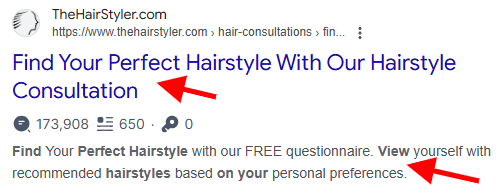Everyone wants how to increase organic traffic to their website. If you wish regular organic traffic to your blog or website, you’ve got to put an organic traffic pipeline in place.
As the internet matures, the need to prove your authority to readers and search engines becomes increasingly crucial.
If you’re wondering how to convert search traffic to visitors, don’t worry. Lucky for you we’ve got the information necessary to learn how to increase organic traffic to your website and success.
What is organic traffic?
Organic traffic is the traffic that clicks to your website or blog from search engine results pages. It does not involve any paid traffic you’re getting via search engine ads.
In general, you get more organic traffic by building websites and pages and using a set of tactics called SEO to rank those posts and pages at the top of the search engine results.
These are some examples of search results that would create organic search traffic:
- The service page found in the URL results
- The blog post found in the URL results
- The product or category page found in the URL results
- The recipe found in the rich recipe results
- A website link in your business listing next to regular search results
- A link to your website found in Google’s ‘people also ask’ box
- A link to your website found under video or image search results
Google or Bing Ads with links to your website don’t count as organic search traffic. While they technically appear in the search results, they’re not organic as you paid for your content to be displayed.
Why is Organic Traffic Important?
Here are a few reasons organic search traffic is important for your business.
It’s free of cost: You may have to pay somebody an hourly wage to create content and optimize it, but it’s still cheaper than running ads for most industries.
It attracts new clients: As long as you target the right search intent and topics your audience cares about, you’ll attract site visitors hungry for your offer.
Accessible to small businesses: You don’t need massive marketing experience or a large budget to create amazing content that people enjoy.
It builds your reputation: The more people view your name in the search results, the more likely they are to see you as trustworthy and select your business.
It gives you audience insights: You can use data from the words people search to reach your website, and how they engage with your content, to make business decisions.
It increases conversion opportunities: Every person who clicks on your website’s search results is an opportunity to gain a lead, spark interest in future content, and drive sales.
How to Increase Organic Traffic?
Establishing well-rounded SEO strategies will be a critical guide for your research, blogging, and overall content strategy. Here are our top 16 tips for how to increase organic traffic:
1. Optimize Your Pages for Humans, Not Search Engines
Optimize your pages for humans, not search engines. This mistake is often one of the big ones companies make when they try to boost organic web traffic to their websites, and you will want to keep an eye on it.

However, search engines determine your search results ranking. Many companies will try to optimize their websites to appease search engines. The reality is that search engines turn to users to help determine how a page ranks.
Search engines such as Google look at metrics adding dwell time, pages visited, and more, which are all indicative of how much a user enjoys your website, If a person dwells on your website for a long time or visits dozens of pages, it means your website is useful and relevant.
However, If your website isn’t optimized for your audience, you risk them bouncing from your website, which leads to lower rankings in search results and less organic traffic.
To prevent this scenario from happening, you need to focus on writing for humans first. If you write in a language and style that makes sense to your audience, you’ll keep users on your pages longer. Writing for humans will improve search engine optimization (SEO) and rankings. As a result, it will help you increase organic traffic on your website.
2. Create a Blog
If you want, how to increase organic traffic, start by creating a blog. Blogging is exceptionally beneficial to your business as it helps you reach your target audience and drive organic traffic for your business, as well as boost your website’s trustworthiness and authority.
When you run a blog, you share valuable knowledge that your audience wants. When they search for this information with the relevant keyword you’re targeting, they find your website and check out your post. It enables you to drive more leads to your page as you provide the helpful information they find.
How to increase your blog traffic?
Regardless of the format of your blog, the important part is that you provide visitors with relevant information. You can always check and look at what websites currently rank highly for the topic and the keyword you’re focusing on to get an idea of the kind of information to integrate into your blog content.
Read Also: Different Types of Keyword in SEO With Example!
3. Publish Content Regularly
Once you’ve built your blog and established a niche, you’ll want to build a schedule or content calendar to publish content regularly. Blogging requires consistently publishing content, and regular publishing enables you to drive organic traffic to your site continually.

When you establish a blog content calendar, it brings a sense of order to your page, It also signals to web visitors that they should continuously check back with your blog to read fresh content. By establishing this consistency, you can attract regular views and increase your chances of converting them to loyal visitors. And of course, you can drive a constant stream of valuable organic traffic to your website.
4. Optimize Content for the Featured Snippet
If you want how to increase organic traffic to your website, you’ll want to optimize your content to appear in the featured snippet. Featured snippets are boxes at the top of search results that provide direct answers to searchers’ questions.

Hence, how can obtaining the featured snippet help boost organic traffic? The tighter organic search result gets 34% of the clicks. When you throw a featured snippet into the mix, the first position’s click-via rate (CTR) drops by 8%. However, when a featured snippet is present, more audiences will click on the listing.
Now you’re wondering, “How do I get this featured snippet position?” There is no one clear-cut method to earn the featured snippet position, but there are journeys you can follow to increase your chances of ranking in the spot, Here are two core ways to optimize for a featured snippet:
Using numbered or bulleted lists to answer the query directly
Numbered and Bulleted lists are a good way to achieve the featured snippet position. This doesn’t mean that you should litter your page with lists, but rather seek appropriate places to integrate them.
For example, if you were trying to rank for a query like “how to repair your damaged hair,” a bulleted or numbered list of tips would be extremely helpful for readers.

Giving a short, to-the-point answer
The other method to optimize for featured snippets is to provide the answer outright. Don’t beat around the bush and include frivolous details to up your word count. Take this featured snippet from the query “How to find the best hairstyle” as an example.

In this instance, you can see that the website answers the question directly. They mention to ensure the hairstyle for a square face, look at the blunt bangs or a short bob to show off that strong jawline. The featured snippet provides a direct answer to the query.
Hence, to increase your chances of appearing in the featured snippet, you must focus on delivering an answer clearly and directly. Additionally, it’s also important that you integrate your main keyword in the section you want to optimize for your featured snippet, so you have a great chance of earning the spot.
Read Also: All SEO Types (Search Engine Optimization): Guide!
5. Hack User Questions for Keyword Research
Have you ever noticed that most conversations between strangers start with a question? The questions & answers are the hallmarks of social living. Now, I will show you how to increase organic traffic help with Quora.
They’re also essential to increasing organic traffic.
Ways to Find User Questions
Every second, thousands of audience go to Quora to ask questions. Quora was started in 2009 by the former CTO of Facebook and is quite famous.
The popularity of Quora makes it a better asset for marketers and content creators. You can hack people’s questions and leverage them in your keyword research.
Follow these simple steps to seek trending questions on Quora:
Go to Quora, and plug your core keyword (e.g., blog writing) into the search box. Click the “enter” button on your keyboard and look for questions that would make interesting blog topics and probably get lots of search traffic.
“What is blog writing” immediately out as a possible keyword.

Keyword research can show you how successful this keyword is. Just enter the keyword search term into a keyword search tool. The tool can then also supply you with additional keywords related to the search query you got from Quora.
What should you do with these keywords?
Build compelling and keyword-rich titles with them.
Ideally, you should combine the Quora question with the keywords you seek with a keyword tool to get the good of both worlds.
A suggested title for a future blog post, drawing on our instance above:
- Improving Your SEO: How Can I Advanced My SEO Skills for Blogging?
Or, how about?
- Better SEO: How Should I Improve My SEO Blogging?
- Improving SEO Skills: How Should I Improve My SEO Skill for Blogging?
Most people indeed search for “improving your SEO” aren’t interested in blogging.
That’s why you should combine the question and the keyword.
However, that’s not the end of the story. You also have to produce high-quality content for those keywords/titles as content is king.
Trust me, if you focus on building content around questions that users have asked, you’ll consistently drive organic traffic.
Furthermore, questions provide evergreen topics that you can address. Questions such as “What is the best way to begin blogging?” will never stop getting asked. New bloggers will always need to know these things.
Quora offers an amazing advantage for your content by helping you seek new angles to take. Hence, whenever you seek a keyword using any research tool, it’s a great idea to use Quoraa to find question-based variations of it.
For example, Canva content marketing team found that “fonts” keywords received close to 800k monthly searches:
In organic listings, they couldn’t compete with authority web pages. Hence, instead of building generic content about fonts, they dug deeper and searched for related questions on Quora:
The Canva team then created in-depth, high-quality content targeting questions about “combining fonts.” The content generated over 5,000 shares on social media and drove thousands of design-centered visitors to the Canva website.
In my experience, the large majority of those who ask questions on Quora aren’t experts. They’re professionals and entrepreneurs finding solutions. Hence Quora has targeted users that, in turn, you can use to drive organic traffic.
Hence if you’re a content marketer or blogger, you can easily use Quora to seek questions that you can answer and generate blog content that will boost your search results.
You remember that Quora isn’t just a “question and answer” site. It’s one of the most valuable resource websites for writers, researchers, digital entrepreneurs, and search engine optimization consultants.
While others struggle to rank for their core keywords due to intense competition, you can stay ahead of the game by leveraging Quora’s audience questions to write high-quality content.
Read Also: What is keyword Stuffing in SEO? Types & How to Avoid!
6. Research and Target Long-tail Keywords
How can you increase organic traffic in other ways? Are you tired of somebody telling you that if you just write amazing content, people will visit your website and you’ll see a surge in organic traffic?
It’s true to a certain extent, but if you sit around waiting for organic traffic to arrive, you’ll never get it. Getting thousands of organic users is much easier if you target long-tail keywords.
Long-tail keywords are 3 to 4-word phrases that typically indicate that a visitor is close to buying or deciding on an action, whether that’s the “best place for Dubai” or “football lessons in France.” They can be a hugely valuable avenue for increasing organic traffic.
After Google rolled out its Panda update, search engine optimization (SEO) experts and bloggers embraced long-tail keywords as they drove the right kind of traffic.
Long-tail keywords help you connect with clients. When properly integrated into your blog article, they can also help you drive 20,000 organic visitors to your website in under 6 months.
When you consider the top 100 – 500 keywords, adding the ones that major brands target, long-tail keywords perform better than famous keywords.
You may not get a ton of traffic via long-tail keywords – they do have fewer search volumes on the whole than head keywords – but you’ll generate targeted traffic. In SEO, I think “targeted” traffic is better than “generic” traffic.
You can use several tools to research long-tail search terms like Semrush, Ahrefs, Ubersuggest, and Google Keyword Planner.
7. Find New Keywords to Fill in Gaps
Keyword optimization doesn’t close after your initial efforts to integrate them. Once you’ve started the content on your blog, consistently conduct keyword research to seek new keywords to target. Doing so lets you keep your keyword strategy current and always stay on top of what phrases and terms your target audience uses to seek your content.

Look for keywords with smaller competition to give yourself a great shot at grabbing the high rankings for them. It gives you an advantage over your competition and forces them to work harder to contend with your website’s established authority on the keyword.
Seeking new keywords also helps you identify keyword gaps in your content and fill them with helpful, relevant content that attracts more organic traffic to your website.
Below are a few easy ways to identify keyword gaps in your content:
- Conduct competitor keyword analyses
- Use tools such as Ahrefs or Google Search Console to monitor keyword data
- Use AI tools to analyze your site
Read Also: What is On-Page vs Off-Page SEO? Different But Important!
8. Target “People Also Ask” & FAQ sections
Another tip on how to increase organic traffic to a website is targeting “People Also Ask” and FAQ sections to directly address related user questions. Including FAQ sections in your pages can increase your ranking power as it gives you an additional opportunity to target relevant keywords & answer user queries that may have yet to be addressed in your page’s back content.
These sections include value to your page and can attract more organic traffic to your website by promptly answering user queries.
9. Create an Enticing Title Tag and Meta Description
When visitors conduct a search and seek your listing in the results, the first thing they view is the title tag and meta description. If you aren’t drawing them in with those two components, you’re missing a valuable opportunity to increase organic traffic to your site.

Your title tag and meta description can be the make-or-break reason that someone hits or doesn’t hit your listing. If you optimize these two components. You can drive more audience to click on your page, which leads to a boost in organic traffic.
- For your title tag: Focus on keeping this under 60 characters. You’ll also want to integrate your main keyword at the front, so search engines and users know your listing is relevant. Make your title tag unique and enticing to encourage clicks!
- For your meta description: Keep this within 160 characters. Integrate your main keyword into the meta description, and ensure that it provides your audience with insight into what to expect on your page.
10. Conduct a Technical SEO Audit
Technical SEO makes your site easy for search engine crawlers to understand and index your website. Technical SEO is also a necessary part of attracting organic traffic to your website as it deals with improving user-friendliness and resolving any technical issues that may inconvenience users.
Begin your technical SEO journey by conducting a website audit. A website audit will help you check crucial backend elements of your site and identify any technical issues that need fixing, like:
- Page speed
- Index status
- Link statuses
- Sitemap errors
- Structured data
- HTTPS status
Want to learn how to conduct your technical SEO audit? Check out our step-by-step beginner’s guide!
What is Technical SEO Audit? Beginner’s Successful Guide!
11. Implement Technical SEO Best Practices
Once you’ve conducted your technical SEO audit, you can regularly improve your website’s technical SEO health by implementing a few best practices to keep your website in tip-top shape. Below are a few technical SEO best practices you can use to improve your website for users and search engines:
- Use HTTPS instead of HTTP
- Ensure your website is mobile-friendly
- Optimize for Google’s Core Web Vitals
- Improve page speeds
- Identify and fix any duplicate content
- Identify and fix any broken links
- Conduct consistent technical SEO audits to stay on top of any issues
Read Also: What is Off-Page SEO Optimization? Helpful Strategies!
12. Share Your Web Pages on Social Media
If you’re relying solely on SEO tactics to help you boost organic traffic, you’re missing out on other valuable ways that will help you drive more traffic.
Social media marketing provides another better opportunity to drive visitors to your website by linking to blog posts or article pages. To drive organic traffic to your page, share your pages on your social media profiles. Not only does it drive your followers back to your site, but if they share your content, it drives new traffic to your page.
13. Earn Backlinks
If you want to increase organic traffic outside of optimizations on your site, we have an amazing strategy for you, earn backlinks. Backlinks are links to your website from other outside websites. These links help boost your site’s trust and authority in your industry.

Backlinks boost organic traffic in two methods. Firstly, someone selecting to link to your website on their page leads to the traffic from their site to your website.
Hence, if a review blog links to your burgers in their blog post about top burger places, anyone who clicks on that link to your website becomes new traffic for your business. Additionally, earning credible backlinks helps boost your authority and trustworthiness, which increases your ranking.
However, how can you earn more backlinks? The great method to earn backlinks is to create relevant, industry-related content. Your blog can serve as the best opportunity for you to earn backlinks from credible websites. Blogging is a great source for backlinks as:
- Share them on social media
- Write on different topics
- Target numerous keywords
- Share them in email newsletters
Since blogs are versatile, they create different avenues and opportunities for you to reach people who will link back to your posts on their page. Reach out to industry authorities and ask them to read your latest blog posts!
Read Also: What 15 Types of Backlinks in SEO are Needed Right Now!
14. Publish Videos on YouTube and Embed Them in Your Written Content
Google increasingly features 3 to 5 YouTube videos close the higher of the SERP for certain queries. If you’re creating video content for your website, whether on product pages or as part of blog articles, consider hosting them on YouTube and optimizing the video for targeted keywords.
Then, you can embed the YouTube video on your website and more your views by gaining traffic from YouTube queries and potentially having your video content pulled directly into the SERP.
Video content continues to rise in popularity, hence don’t waste this opportunity to connect with a vast audience.
Read Also: What is Off-Page SEO Techniques? 17 Best Methods!
15. Allow Guest Blogging for High-Quality Posts on Your Website
A great way how to increase organic traffic to a website. The best way to increase the amount of content you’re creating is to invite bloggers and other subject matter experts to write guest posts for your website. Not only is guest blogging a method to get more content for your website, but it also offers additional traffic benefits.
- It’s common for guest bloggers to promote the content they wrote for your website.
- Many guest bloggers will also link to the article on your website that they wrote for you.
- You give your users a more diverse set of experiences and viewpoints.
- Connect with guest bloggers via marketing communities and social media, and focus on seeking experts whose expertise is relevant to your following.
16. Revamp outdated content
The last journey we’ll look at to boost organic traffic is revamping outdated content. When you publish content, it becomes outdated over time. You may not drive as much traffic to your site as your competition has more updated pages.
If you want to increase organic search traffic to these pages, begin by reoptimizing them. Reoptimizing older content enables you to breathe fresh life into pages on your website that aren’t performing well. Hence, what does reoptimizing entail?
This will depend upon the page. For a few pages, just updating the information on it can help you increase organic traffic. Your industry may change, and the information on the page no longer becomes relevant, hence, you must update the content to reflect the current standards. You should look to update things such as:
- Dates
- Statistics
- Outdated information
- The structure of your page should be based on the intent of the user
Also, it may be that your page isn’t easily readable for your users. You may need to reorder text into short paragraphs, include visuals to help break up the text, or use headings to make your pages skimmable. Revamping articles will help your content perform great, so you can increase organic traffic to your website.
Read More Blogs

